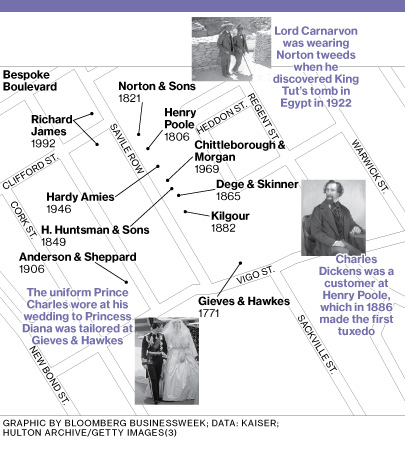London’s Savile Row Tailors Strive to Stay a Cut Above
August 23, 2013 Leave a comment
London’s Savile Row Tailors Strive to Stay a Cut Above
By Sarah Shannon on August 22, 2013
Visitors to 10 Savile Row in London are greeted by photographs of the current Sultan of Oman in full military regalia. Deeper inside the shop of tailor Dege & Skinner, above a rack of silk handkerchiefs, hangs a smaller picture of Prince William. There’s a reason for the sultan’s exalted status: Half of Dege & Skinner’s revenue comes from outside the U.K., and that share is growing.Savile Row shops are struggling to stay relevant in a global marketplace where British clients increasingly buy tailored offerings from Italian luxury powerhouses such as Ermenegildo Zegna. Dege & Skinner, Savile Row’s first maker of bespoke (or tailor-sewn) shirts, this year began advertising for the first time in its 148-year history. It’s also taken to communicating with potential clients by e-mail. The fashion quarter, synonymous with British suits since 1733, has outfitted notables from Emperor Hirohito of Japan to Charles Dickens, and it’s showing its age. There are approximately 17 tailors now on the street, about half as many as 50 years ago. And there’s newer competition, such as Burberry Group(BURBY), which is offering its own bespoke tailoring in 70 of its stores globally.
The Savile Row Bespoke Association lost its battle to keep Abercrombie & Fitch (ANF) from opening a children’s clothing store at the Beatles’ former London headquarters at No. 3 Savile Row, site of the 1969 rooftop concert that was the band’s final live performance. The U.S. retailer has agreed not to have promotional events, models at the entrance, or loud music or crowds outside the store. Still, the Bespoke Association said the retailer is “out of keeping with the Row and its iconic status,” according to Gieves & Hawkes Chairman Mark Henderson, a spokesman for the group.
And with midmarket clothiers like Suitsupply offering personally tailored suits for $899 in numerous countries, outlets like Dege & Skinner are simultaneously modernizing and touting their bona fides. “We’re true, proper Savile Row tailors as opposed to those who call themselves ones, who wouldn’t know scissors from shears,” Managing Director William Skinner says. The appeal of the tailor is its nod to “male pride,” he says. “Our job is to bring out the peacock side in men.”
Dege & Skinner, a family business founded in 1865, is steeped in British heritage. It outfits cadets at Britain’s Royal Military Academy Sandhurst, including Prince Harry and brother William. Skinner spends three months of the year outside England, setting up shop in hotel suites in cities such as New York and Houston for invitation-only fittings, or jetting off for one-on-one sessions with wealthy customers in the Middle East and Asia.
Demand for bespoke suits has out-paced the growth of the overall menswear market, driven by demand from Asia, says Mintel retail analyst Richard Perks. (The U.K. menswear market climbed 2 percent last year, according to Mintel.) But it’s not easy money. It takes about two months to make a £3,500 ($5,410) suit. That includes 55 hours of labor—and at least two fittings—by various members of Skinner’s team of 21 cutters and tailors.
Dege & Skinner, whose dressing room contains a blocked double-barrel shotgun for sportsmen to hold while trying on its £2,000 hunting blazers, isn’t the only tailor relying on overseas customers. Demand is increasingly coming from young Chinese men, some attending schools in Britain, who “aspire through reading literature to the finer things in life,” says Simon Cundey, director of Dege & Skinner’s Savile Row neighbor Henry Poole. The number of Middle Eastern shoppers, particularly from the wealthy emirate of Qatar, is also growing, while Russians and Ukrainians have provided a strong market for more than five years, Cundey says.
“They tend to look for the finest quality,” Skinner says of his foreign customers, who favor fabrics like cashmere-silk blends, which can push the cost of a suit up to £11,000. In contrast, Britons tend to buy for the “long term,” choosing classic-cut suits in woolen or cotton fabrics.
To lift demand for his sport coats, shirts, ties, and cuff links and bring back more Britons, Skinner has broken with tradition and e-mailed invitations to the tailor’s latest trunk shows rather than sending them by post. Dege & Skinner’s first ads—in publications like U.S. riding journals—come after over a century of building the business mainly by word of mouth and referrals. Skinner has even resorted to celebrity endorsements.
He says he’ll make suits at “an agreed rate,” lower than his normal fee, for men who are in the “right circles,” in exchange for knowing they’ll recommend Dege & Skinner to potential clients. That has included a young banker who recommended his boss and some professional athletes Skinner is loath to name. Some things don’t change: On Savile Row, discretion, as always, is of the essence.
The bottom line: On London’s Savile Row, custom suits can cost more than £11,000. The number of foreign customers is growing fast.

